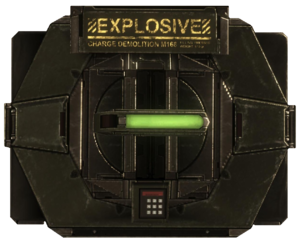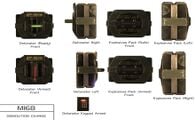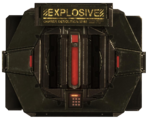M168 Demolition Charge: Difference between revisions
From Halopedia, the Halo wiki
m (Text replacement - "{{[Ee]ra\|[^}\n]*(Forerunner|Covenant|Human|UNSC|HCW|Post)[^}\n]*}}" to "{{Status|Canon}}") |
m (→Disadvantages: Replacing Specifications with Design details, due to the section discussing general design features + general fixes) |
||
| (One intermediate revision by one other user not shown) | |||
| Line 20: | Line 20: | ||
==Overview== | ==Overview== | ||
The M168 Demolition Device is an explosive ordnance that is used to destroy, or clear large structures. Because of the nature of the device, it is more commonly employed as a device to destroy buildings, or other structures, | The M168 Demolition Device is an explosive ordnance that is used to destroy, or clear large structures. Because of the nature of the device, it is more commonly employed as a device to destroy buildings, or other structures, and not the enemy itself. | ||
The M168 has three vital components to it, the first is the explosives pack itself which can be attached to any surface by using an adhesive strip on the back of the pack. The second component is the charge, the charge itself is also an explosive pack, the only major difference is the front panel of the charge has an arming handle and a keypad. From here the detonation code and countdown timer can be set and authorized, once the code has been verified the charging handle can then be rotated to its "armed" position. Once in the armed position an arming signal is sent to the other explosives within range. The third component is the wireless card which will locate and connect to a terminal or heads up display and wait to receive the detonation signal. | The M168 has three vital components to it, the first is the explosives pack itself which can be attached to any surface by using an adhesive strip on the back of the pack. The second component is the charge, the charge itself is also an explosive pack, the only major difference is the front panel of the charge has an arming handle and a keypad. From here the detonation code and countdown timer can be set and authorized, once the code has been verified the charging handle can then be rotated to its "armed" position. Once in the armed position an arming signal is sent to the other explosives within range. The third component is the wireless card which will locate and connect to a terminal or heads up display and wait to receive the detonation signal. | ||
| Line 27: | Line 27: | ||
The M168 excels at taking down large objects that may be preventing friendly infantry and armor from reaching an objective, or preventing the enemy from gaining access to an area. While the M168 is not designed for killing infantry the large blast radius of the device can severely wound, or kill anything within range and if the placement is just right it may be used to cunningly kill the enemy by bringing large objects and debris on them. | The M168 excels at taking down large objects that may be preventing friendly infantry and armor from reaching an objective, or preventing the enemy from gaining access to an area. While the M168 is not designed for killing infantry the large blast radius of the device can severely wound, or kill anything within range and if the placement is just right it may be used to cunningly kill the enemy by bringing large objects and debris on them. | ||
===Disadvantages=== | ===Disadvantages=== | ||
The M168's main disadvantage is that is it not designed for combat and as such its use as an explosive to eliminate enemy infantry and armor is limited. The M168 must also be detonated by a keypad terminal or an authorized users [[Heads Up Display]], without this authorization the final detonation signal cannot be sent to the M168. | The M168's main disadvantage is that is it not designed for combat and as such its use as an explosive to eliminate enemy infantry and armor is limited. The M168 must also be detonated by a keypad terminal or an authorized users [[Heads Up Display]], without this authorization the final detonation signal cannot be sent to the M168. | ||
Latest revision as of 06:42, June 12, 2022
| M168 Demolition Charge | |
|---|---|

| |
| Production overview | |
|
Type: |
Explosives Device |
| Specifications | |
|
Effective range: |
Medium |
| Service history | |
|
In service: |
|
- "Hey, you wanna do this? Be my guest. But this, ain't...a job you wanna rush."
- — PFC Michael "Mickey" Crespo arming an M168[1]
The M168 Demolition Charge is a United Nations Space Command explosive device.[1]
Overview[edit]
The M168 Demolition Device is an explosive ordnance that is used to destroy, or clear large structures. Because of the nature of the device, it is more commonly employed as a device to destroy buildings, or other structures, and not the enemy itself.
The M168 has three vital components to it, the first is the explosives pack itself which can be attached to any surface by using an adhesive strip on the back of the pack. The second component is the charge, the charge itself is also an explosive pack, the only major difference is the front panel of the charge has an arming handle and a keypad. From here the detonation code and countdown timer can be set and authorized, once the code has been verified the charging handle can then be rotated to its "armed" position. Once in the armed position an arming signal is sent to the other explosives within range. The third component is the wireless card which will locate and connect to a terminal or heads up display and wait to receive the detonation signal.
Advantages[edit]
The M168 excels at taking down large objects that may be preventing friendly infantry and armor from reaching an objective, or preventing the enemy from gaining access to an area. While the M168 is not designed for killing infantry the large blast radius of the device can severely wound, or kill anything within range and if the placement is just right it may be used to cunningly kill the enemy by bringing large objects and debris on them.
Disadvantages[edit]
The M168's main disadvantage is that is it not designed for combat and as such its use as an explosive to eliminate enemy infantry and armor is limited. The M168 must also be detonated by a keypad terminal or an authorized users Heads Up Display, without this authorization the final detonation signal cannot be sent to the M168.
Tactical Uses[edit]
The M168 was used during the Battle of Mombasa when Mickey and Dutch, two ODSTs from Dare's Shock Trooper Squad were attempting to halt the Covenant's advance on the ONI Alpha Site, they were successfully able to halt Covenant armor advance via the bridge, but were unable to stop the enemy from overrunning the facility, forced to retreat they were able to destroy the building using the M168.[1]
Production notes[edit]
- On the level Halo 3: ODST level Mombasa Streets, the remains of an M168 serves as the beacon to trigger the flashback level ONI Alpha Site.
- On the level ONI Alpha Site, there is an unarmed M168 in the bottom of the shaft inside Alpha Site. It is best seen in pan cam or theater. Players can also see it if they fall into the pit. Though it can sometimes be seen armed, what causes this is unknown.
Gallery[edit]
Rookie holding the remains of the explosive's detonator.
List of appearances[edit]
- Halo 3: ODST (First appearance)
Sources[edit]
- ^ a b c Halo 3: ODST, campaign level ONI Alpha Site



